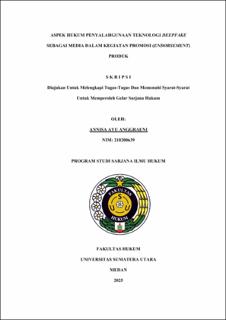| dc.contributor.advisor | Azwar, Tengku Keizerina Devi | |
| dc.contributor.advisor | Sukarja, Detania | |
| dc.contributor.author | Anggraeni, Annisa Ayu | |
| dc.date.accessioned | 2025-07-25T08:25:24Z | |
| dc.date.available | 2025-07-25T08:25:24Z | |
| dc.date.issued | 2025 | |
| dc.identifier.uri | https://repositori.usu.ac.id/handle/123456789/107529 | |
| dc.description.abstract | The advancement of digital technology has had a significant impact across various sectors, including promotion and advertising. One of the innovations that has drawn considerable attention is deepfake technology an artificial intelligence based tool capable of manipulating visual and audio content to appear convincingly real. The use of deepfake in product promotion raises new legal challenges, particularly when it is employed without consent or misleads consumers. This thesis aims to examine the legal perspectives on the use of deepfake in Indonesia, including legal protection for individuals whose identities are misused and the accountability of business actors who employ such technology in their promotions.
The method used in writing this thesis is the normative research method, which refers to legal norms through literature review to obtain secondary data in the form of primary, secondary, and tertiary legal materials related to the issue being studied. This research has a descriptive nature with a legislative and comparative approach.
The findings reveal that the misuse of deepfake technology in product promotion not only violates consumer rights and individual privacy, but also presents serious challenges to the national legal system. Although deepfake is a relatively new technology and lacks specific regulations in Indonesia, existing legal provisions can still serve as a preliminary basis for addressing misuse cases, despite their limited scope and substance. The absence of specific and comprehensive legal norms for this technology highlights the urgency for regulatory reform that is adaptive to digital developments. Referring to regulatory practices in China, Indonesia must promptly formulate legal policies that are not only repressive but also preventive, to ensure legal certainty, public protection, and business responsibility in this era of digital disruption. | en_US |
| dc.language.iso | id | en_US |
| dc.publisher | Universitas Sumatera Utara | en_US |
| dc.subject | Deepfake | en_US |
| dc.subject | Technology Misuse | en_US |
| dc.subject | Product Promotion | en_US |
| dc.title | Aspek Hukum Penyalahgunaan Teknologi Deepfake sebagai Media dalam Kegiatan Promosi (Endorsement) Produk | en_US |
| dc.title.alternative | Legal Aspects of Deepfake Technology Abuse as a Medium in Product Promotion (Endorsement) Activities | en_US |
| dc.type | Thesis | en_US |
| dc.identifier.nim | NIM210200639 | |
| dc.identifier.nidn | NIDN0001027001 | |
| dc.identifier.nidn | NIDN0011098301 | |
| dc.identifier.kodeprodi | KODEPRODI74201#Ilmu Hukum | |
| dc.description.pages | 137 Pages | en_US |
| dc.description.type | Skripsi Sarjana | en_US |
| dc.subject.sdgs | SDGs 16. Peace, Justice And Strong Institutions | en_US |


